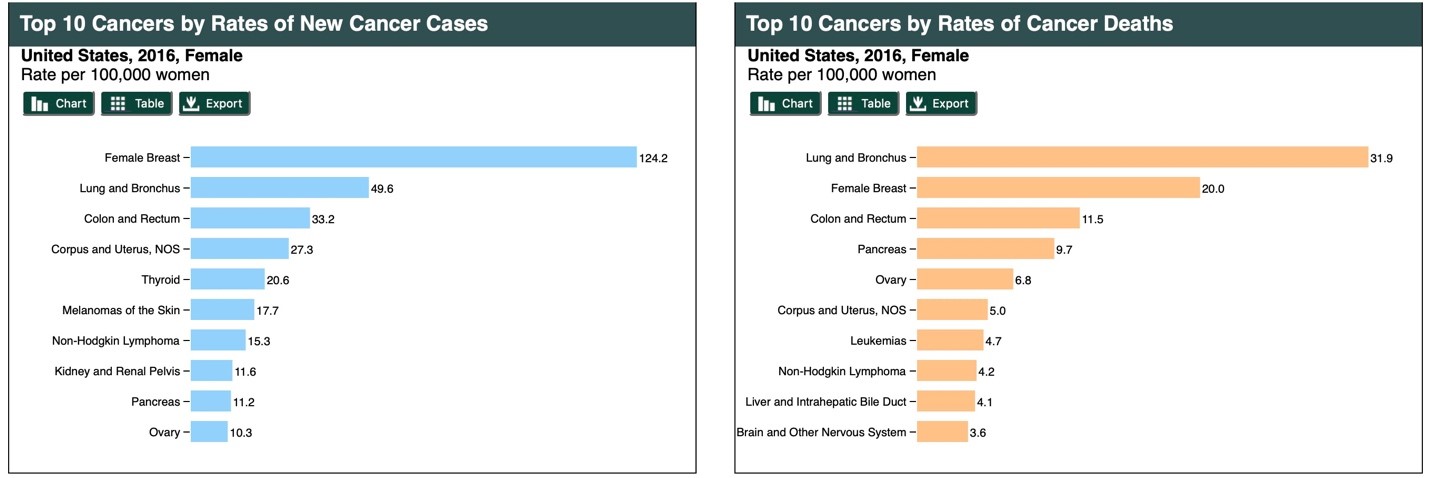WHAT TO KNOW ABOUT CANCERS THAT AFFECT WOMEN, Michael Silverstein, MD (Digital)

Although everyone should be concerned about their chances of cancer, it’s important to know about the cancers that affect women so you know what to look for and discuss with your gynecologist or primary physician. When it’s detected early, you have many more options for effective and life-saving treatment. Here are some things to know about these cancers.
Breast Cancer
In the United States, the most common cancer in women is breast (124,000 cases), and approximately 20,000 women die of this disease. Breast cancer can happen at any age, but your risk goes up as you get older. Genetic factors can be one of the highest risks for breast cancer, so it’s very important to talk to your family about any members who have experienced it. The American Cancer Society recommends early detection as the best way to defend against breast cancer. We recommend you begin getting mammogram screenings annually beginning at 40. Most often, early breast cancers are cured by combinations of lumpectomy (removing breast tissue surrounding the tumor), lymph node sampling, and chemotherapy.
Uterine (Endometrial) Cancer
In the United States, uterine cancer results in about 27,000 cases and 5.000 deaths. Uterine cancer is more common in women who have not had children (called a nullipara) and who are overweight, have diabetes, or hypertension. Uterine cancer usually affects the different layers of tissue inside it, called endometrium. Uterine cancers are often diagnosed because of vaginal bleeding after menopause, and the American Cancer Society recommends all women be told about these symptoms and risks when they begin menopause. Endometrial cancer can often be treated with a hysterectomy, or removal of the uterus.
Ovarian Cancer
In the United States, ovarian cancer can produce about 10,300 cases and 6,800 deaths. While a small portion of these are because of genetic risk factors, the majority are sporadic and difficult to screen for. Ovarian cancer seems to be more common in women who have not had children. The use of combination (estrogen and progesterone) birth control pills may reduce the incidence. There are currently no reliable screening tests for this cancer. However, symptoms like swelling, bloating, digestive problems, abdominal pain, and frequent urination should be reported to your gynecologist.
Cervical Cancer
In the United States, cervical cancer can result in about 12,000 cases, and 4,200 deaths. Cervical cancer is primarily caused by certain types of the human papilloma virus (HPV) which can be transmitted during sex with someone who has HPV. Additionally, risk factors can include smoking, having HIV or AIDS, poor nutrition, and infrequent Pap testing. The Pap smear and HPV screening are excellent tools for reducing both the incidence and risk of death from this disease. The American Cancer Society recommends cervical cancer screening should begin at 21 years old, and your gynecologist can recommend the right frequency for your age group and risk factors. Additionally, an HPV vaccine exists and can prevent infection from cancer-causing HPV when given to older children and teenagers.
Lung Cancer
In the United States, lung cancer results in 49,600 cases, and approximately 31,900 women die from this form of cancer. It’s estimated that 8 out of 10 lung cancer deaths are caused by smoking. For this reason, not smoking is the most effective way to prevent lung cancer, even if you already smoke. However, yearly screenings are recommended for both men and women at age 55 who smoke or previously smoked.
Colon Cancer
In the United States, colon cancer produces about 33,000 cases with about 11,500 deaths as a result. It begins with small growths that develop on the lining of the colon or rectum called polyps. Sometimes, polyps are not cancerous and are not cause for concern. However, some polyps can be pre-cancerous and need to be removed. If they are removed early, colon cancer can be prevented. This means that regular screenings are the most important step in preventing it. It’s recommended that everyone, both men and women, begin having regular exams beginning at 45. Colon cancer can occur based on risk factors like a family history of colon cancer.

Schedule an Appointment
During an appointment at our New York City office, our experienced gynecologists can make sure you have the information you need to keep your body healthy and happy. We can also perform comprehensive tests during a Well-Woman’s Appointment and recommend the right specialists. To schedule an appointment, we invite you to call or fill out our online form.
https://www.cancer.org/healthy/find-cancer-early/womens-health/cancer-facts-for-women.html
Maternal Fetal Medicine blogs are intended for educational purposes only and do not replace certified professional care. Medical conditions vary and change frequently. Please ask your doctor any questions you may have regarding your condition to receive a proper diagnosis or risk analysis. Thank you!







